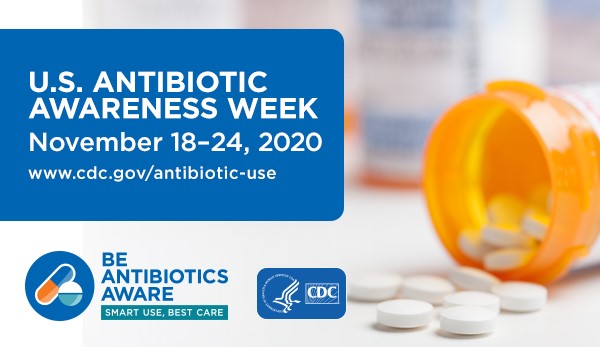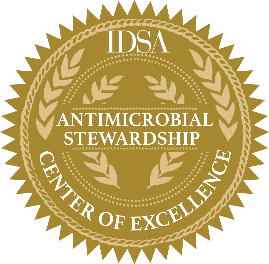

Dana D Byrne, MD, MSCE, Infectious Diseases Specialist and Antimicrobial Stewardship Program Director at Cooper.
It’s CDC and World Antimicrobial Awareness Week!
Every year, World Antimicrobial Awareness Week aims to increase awareness of global antimicrobial resistance (AMR) and to encourage best practices among the general public, health workers and policy makers to stop the further emergence and spread of drug-resistant infections. The theme for World Antimicrobial Awareness Week 2020 is “United to preserve antimicrobials.”
Your Cooper University Health Care Antimicrobial Stewardship Program (ASP) Team will be hosting events throughout the week visiting different areas of the hospital, urgent cares and outpatient clinics, championing antibiotic awareness. We hand out educational materials and stickers, do educational talks, and will be handing out “Stewardship Stars” to those who have demonstrated exemplary stewardship.
Watch for our updates throughout the week on @CooperIDtweets! If you’re a Cooper employee, be sure to check out Pulse+ for more content.
Some key messages from the CDC:
- Antibiotics can save lives. When a patient needs antibiotics, the benefits outweigh the risks of side effects and antibiotic resistance.
- Antibiotics aren’t always the answer. Everyone can help improve antibiotic prescribing and use. Improving the way healthcare professionals prescribe antibiotics, and the way we take antibiotics, helps keep us healthy now, helps fight antibiotic resistance, and ensures that these life-saving antibiotics will be available for future generations.
- Antibiotics do not work on viruses, such as those that cause colds, flu, bronchitis, or runny noses, even if the mucus is thick, yellow, or green.
- Antibiotics are only needed for treating certain infections caused by bacteria, but even some bacterial infections get better without antibiotics. Antibiotics aren’t needed for many sinus infections and some ear infections. Antifungal drugs treat fungal infections.
- Do your best to stay healthy and keep others healthy by cleaning hands by washing with soap and water for at least 20 seconds or using a hand sanitizer that contains at least 60% alcohol; covering your mouth and nose with a tissue when you cough or sneeze; staying home when sick; and getting recommended vaccines, such as the flu vaccine.
Further information can be found here:
Fact Sheet: Antimicrobial Awareness (The World Health Organization)
Get Involved: U.S. Antibiotic Awareness Week (The Centers for Disease Control and Prevention)
 Dana D Byrne, MD, MSCE is an Infectious Diseases Specialist at Cooper University Health Care and Cooper’s Antimicrobial Stewardship Program Director. She is also the Associate Program Director of the Infectious Diseases Fellowship.
Dana D Byrne, MD, MSCE is an Infectious Diseases Specialist at Cooper University Health Care and Cooper’s Antimicrobial Stewardship Program Director. She is also the Associate Program Director of the Infectious Diseases Fellowship.
In 2020, Cooper University Health Care was awarded the designation of Antimicrobial Stewardship Center of Excellence by the Infectious Diseases Society of America. Cooper is one of 101 programs nationwide to have received the designation since the program’s launch in 2017. Read more about this recognition on our blog.
